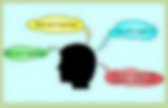

6 Free Websites for Learning and Teaching Science. From robotics to space research, from physics to computer science, the Internet is a vast trove of information about the sciences.
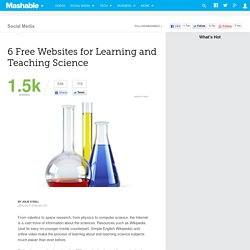
Resources such as Wikipedia (and its easy-on-younger-minds counterpart, Simple English Wikipedia) and online video make the process of learning about and teaching science subjects much easier than ever before. Rather than resorting to yet another 600-page textbook, next time you're hard up for understanding or inspiration, check out one of these six websites that offer information on the sciences. And particularly if you're a scientist or educator yourself, let us know in the comments where you hang out online to learn about and discuss your favorite science topics. 1.
Scitable If genetics and evolution are of interest to you, Scitable is a must-see resource. Must-See Page: Student Voices, a blog about science by students, for students. 2. iTunes U Cool Fact: "This immense machine will recreate, on a tiny scale, conditions that existed just after the Big Bang. 21st-Century Teacher Education. For almost as long as there have been institutions dedicated to the preparation of new teachers, the endeavor has come in for criticism.
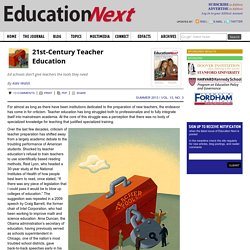
Teacher education has long struggled both to professionalize and to fully integrate itself into mainstream academia. At the core of this struggle was a perception that there was no body of specialized knowledge for teaching that justified specialized training. Over the last few decades, criticism of teacher preparation has shifted away from a largely academic debate to the troubling performance of American students. Shocked by teacher education’s refusal to train teachers to use scientifically based reading methods, Reid Lyon, who headed a 30-year study at the National Institutes of Health of how people best learn to read, once stated, “If there was any piece of legislation that I could pass it would be to blow up colleges of education.”
An occasional insider has joined the fray. The Perspective of Teacher Educators Far beyond Semantics • Early reading. Strategies for Effective Lesson Planning. Stiliana Milkova Center for Research on Learning and Teaching A lesson plan is the instructor’s road map of what students need to learn and how it will be done effectively during the class time. Before you plan your lesson, you will first need to identify the learning objectives for the class meeting. Then, you can design appropriate learning activities and develop strategies to obtain feedback on student learning. A successful lesson plan addresses and integrates these three key components: Objectives for student learningTeaching/learning activitiesStrategies to check student understanding Specifying concrete objectives for student learning will help you determine the kinds of teaching and learning activities you will use in class, while those activities will define how you will check whether the learning objectives have been accomplished (see Fig. 1).
25 Best Websites for Teachers. 1.
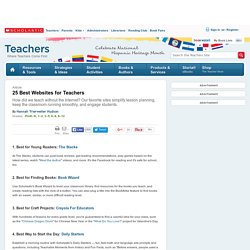
Best for Young Readers: The Stacks At The Stacks, students can post book reviews, get reading recommendations, play games based on the latest series, watch "Meet the Author" videos, and more. It's like Facebook for reading and it's safe for school, too. 2. Best for Finding Books: Book Wizard Use Scholastic's Book Wizard to level your classroom library, find resources for the books you teach, and create reading lists with the click of a button. 3. With hundreds of lessons for every grade level, you're guaranteed to find a colorful idea for your class, such as the "Chinese Dragon Drum" for Chinese New Year or the "What Do You Love? " 4. Establish a morning routine with Scholastic's Daily Starters — fun, fast math and language arts prompts and questions, including Teachable Moments from history and Fun Facts, such as "Before erasers, people used a piece of bread! " 5. 6. 7. At the National Library of Virtual Manipulatives, you'll find activities for every area of math at every grade level.
Podcast. Type of digital media A podcast is an episodic series of spoken word digital audio files that a user can download to a personal device for easy listening.
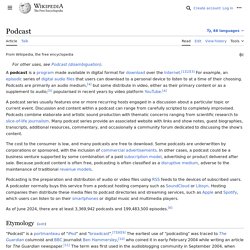
Streaming applications and podcasting services provide a convenient and integrated way to manage a personal consumption queue across many podcast sources and playback devices. A podcast series usually features one or more recurring hosts engaged in a discussion about a particular topic or current event. Discussion and content within a podcast can range from carefully scripted to completely improvised. Podcasts combine elaborate and artistic sound production with thematic concerns ranging from scientific research to slice-of-life journalism.
The cost to the consumer is low. People are motivated to create a podcast for a number of reasons. Production[edit] Podcasting studio in What Cheer Writers Club in Providence, Rhode Island There are several different mobile applications that allow people to subscribe and listen to podcasts.